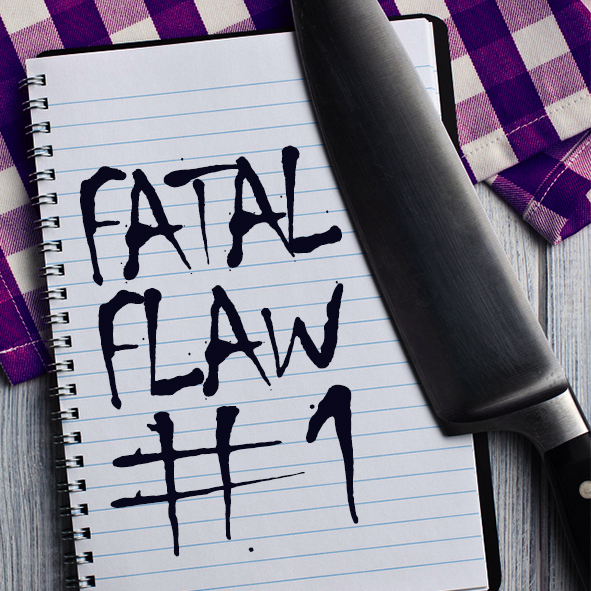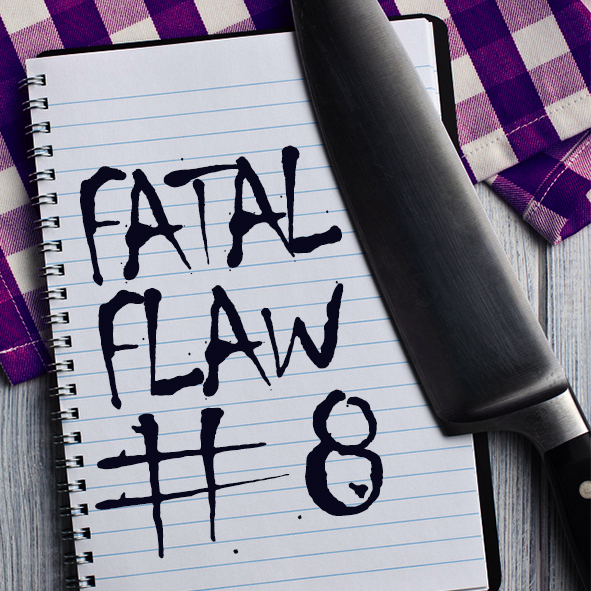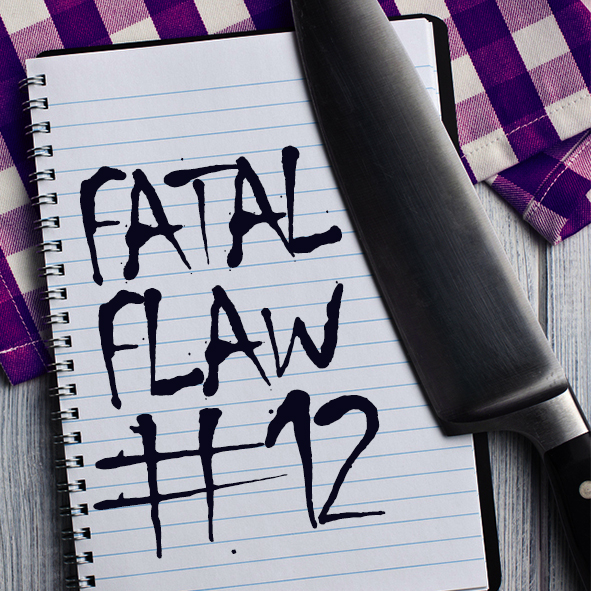Avoiding the Vague Swamp
This month we’re taking a hard look at Fatal Flaw # 3: Weak Construction. Last week editor Rachel Starr Thomson showed us the many pitfalls of weak writing as manifested by our sentence structure and bland choice of words. This week editor Linda Clare warns us about the “Vague Swamp” and how to stay out of it.
The fictional world you’ve created for your novel exists in your mind as fully imagined. This means there are a myriad of details you’ve assigned to the world—far too many details to write down in any one scene. The details you do share with readers will shrink drastically if you employ words that aren’t precise. Using vague or generalized words to describe the world you so fully imagined takes away from the experience you wish readers to have.
We can divide “Vague Swamp” words into three general categories: Intensifiers, Diminishers, and Vague-aries. These words are nouns or modifiers (adjectives or adverbs) that are meant to give a word more precise meaning but which do little work to define the object. Intensifier examples include: very, really, mostly, many, large, a lot, huge. Diminishers: small, tiny, little, some. Vague-aries: something, situation, circumstance, thing, stuff, problem.
Now let’s look at how a writing sample with intensifiers, diminishers, and/or vague-aries might be rewritten to tighten the prose and give readers a more precise picture of what you’re trying to convey:
BEFORE:
James tried to explain how he had managed to get out of the situation. A large cat had taken some of his stuff, and now he had a huge problem. “I can’t go to work without certain things,” he told his boss.
“It’s the little things that have me worried,” the boss said. “The small stuff is getting out of hand.”
“Well, there are a lot of things I worry about too. In fact, I’ve got a big payment coming up. You have to let me do my shift today.” James rubbed the large bruise on his knee. “Besides, you haven’t tangled with this cat. He’s the biggest one I’ve ever seen. And he loves to steal stuff.”
The boss laughed. “Who ever heard of a cat burglar who was a real cat? I think you’re blowing the situation out of control.”
“It’s true, I swear. Just give me a tiny bit of leeway here. I can’t come into work without my stuff!”
“Sorry, James. You’ve given some excuses, but this one takes the cake. Go find someone else to con.”
James hung up the phone. Outside, that large cat was walking away, his last pair of socks in Kitty’s petite jaws.
AFTER:
James tried to explain how he had managed to get out of trouble with the boss. A raccoon-sized cat had taken three pairs of socks and now he had no socks to wear to work. “I can’t go to work without my argyle socks,” he told his boss.
“It’s the times you were late that have me worried,” his boss said. “The three consecutive tardies are getting out of hand.”
“Well, I worry about the fact that I was late three times too. In fact, I’ve got a five-thousand-dollar payment coming up. You have to let me do my shift today.” James rubbed the fist-sized bruise on his knee. “Besides, you haven’t tangled with this cat. He’s the size of a raccoon! And he loves to steal clothing.”
The boss laughed. “Who ever heard of a cat burglar who was a real cat? I think you’re blowing the missing-socks-caper out of proportion.”
“It’s true, I swear. Just give me a pass this time. I can’t come into work without my argyle socks!”
“Sorry, James. You’ve given three excuses, but this one takes the cake. Go con the CEO.”
James hung up the phone. Outside, that raccoon-sized cat was walking away, James’s last pair of argyle socks in his kitty-sized jaws.
As you can see, it’s much easier to picture a scene when you use specific words instead of words from the “Vague Swamp.” When you paint a scene for readers, be sure the description is specific before you wade into the Vague Swamp. After a first mention, using a few less specific words prevents redundancies.
EXAMPLE:
From her cordovan leather chair, Darla glanced out the bay window and gasped. That same forest-green 1967 Ford Mustang convertible had circled Fantasy Drive three times now. The dyed-blond hairs on her neck raised, but it was too early to call the Los Angeles Police Department. She kept her right hand hovering over her iPhone 6, in case that Ford Mustang convertible rounded Fantasy Drive’s corner again.
The example is chockful of specifics, but in this case too many specifics weigh down the prose. With so much repetitive detail, readers will get the idea the writer doesn’t think they’re very smart.
REWRITE:
From her cordovan leather chair, Darla glanced out the window and gasped. That same forest-green 1967 Ford Mustang convertible had circled Fantasy Drive several times now. The hairs on her neck raised, but it was too early to call the police. She kept her hand hovering over her cell, in case that Mustang rounded the corner again.
In the rewrite, I purposely kept some details and eliminated others based upon how important the detail was to the scene’s overall purpose and action. It makes no difference to readers whether Darla’s hair is blond or dyed or which hand hovers over the phone. In much the same way, one could argue for keeping the police location, but I’d recommend at least shortening it to LA Police or LAPD.
It’s important that your scenes are believable to readers. If you wander too far into the “ Vague Swamp,” readers won’t be able to immerse themselves in your fictional world. The fiction writer’s ability to create a “vivid and continuous dream”—as John Gardner famously advises—directly influences how fully readers experience any scene.
Remember your English teacher’s advice not to write about a red car but instead a gleaming maroon Subaru? If you litter your scenes with vague or generalized words from the “ Vague Swamp,” you automatically limit readers’ ability to re-create the scene you have imagined. By concentrating on a few important concrete sensory details, you give readers a more complete fictional experience. This experience goes beyond cinema in that you can re-create tastes, touch, and smell—details that movies can only hint at. Your readers will be able to imagine more fully the world you’ve created.
Your turn:
When do you think vague words might actually be more useful than specifics? If you withhold information from readers in the form of vaguely worded prose, how soon do you think you’re obligated to fill in those specifics? What qualities do you think make a scene believable or less so and why?











This hits home for me. After I’ve completed a draft of a scene, I often have to dig it out of the vague swamp, particularly in terms of intensifiers and diminishers. I like to think of those as ways to turn up or down the volume on my adjectives and adverbs. “Rather,” “Just” and “Only” are three the creep into my writing. When I’m in editing mode, I do searches for all my habitual volume words and try to delete them and choose a better word for them to modify. For example, I’ll change ‘rather angry’ to ‘miffed’ or ‘annoyed’ or ‘screaming mad’ depending on exactly what level of anger I’m trying to portray.
The only time I purposely leave things a little vague is if the description doesn’t register or matter to my POV character. If my character is walking through a parking lot, I certainly don’t want to label make and color for everything she sees. Too much information can distract the reader from the one or two very precise images that the reader needs to focus on and dilute their impact. Actually, Susanne’s Shoot Your Novel helps a lot with deciding what to bring into sharp focus with precise language.
Sara,
Thanks for weighing in! I wholeheartedly recommend drafting with no regard to the Vague Swamp. But when you revise, well it sounds as if you’ve got your “vague zapper” on full kill setting. Keep Writing!
Linda
Great examples, Linda. A few well-placed details can make a scene come alive. Too many–as in the 3rd passage–can weigh it down. It’s hard to find just the right balance.
Thanks, Robin. The balance you mention is the key.
Keep Writing!
Linda
Yesterday I spent a little time de-vaguing the latest chunk of my writing. Definitely a valuable exercise!
Susannah,
I think it’s kind of like a treasure hunt to weed out all those Vague Swamp words.
Keep Writing!
Linda
This is great advice. I’m always looking for the right balance that will keep the reader engaged. Appreciate your insight!
Sorry to reply so late, Karen. You are very welcome and I encourage you to KEEP WRITING!
Linda
Excellent advice and examples, Linda! Sometimes little things make a huge difference.
Christy,
Whether you are looking at the big picture or for the little things, it all matters to dedicated writers. Thanks and KEEP WRITING!
Linda
Great post! Very, really, and a bit, are all words I have to go back and remove from my work. Good tips on making things more specific.
Elise,
Thanks VERY much.
Keep Writing!
Linda
Although you were laying it on thick to make your point in the ‘Before’, that example was also rather repetition heavy.
I really like the word ‘Medieval’ to describe an event in a contemporary scene but you can only use it twice, at the very most, in a story and a ‘story’ also means a series. I used it three times spread out over 660k+ words but a single reader wrote as much in a review (there is always one, isn’t there?).
It pays to keep track of words and phrases in order to avoid that.
‘They could see black smoke from mortar and artillery rounds that was drifting away, the shell and mortar fire pausing to allow the US Navy aircraft to carry out their ordnance runs.
“Zero One, ‘Plume’, pop that smoke…..I see yellow?”
“Plume confirms yellow!”
Nikki felt a jaw dropping moment as they now approached close enough to make out more detail. Looking half right out of the canopy and noting that the typical British knack of understatement was alive and well and embodied in the Coldstream Guards FAC. It was almost medieval, the ‘large numbers’ were a sea of humanity breaking upon an area marked with yellow signal smoke. The Chinese numbered in the thousands and the friendlies were a hundred, if that, and the forward air controller was down there where the fighting was hand to hand.
Banking hard right the F-14s came down to just a hundred feet above the ground.’
Thank God for the Thesaurus but no synonym quite works as well as Medieval.
Thank you very much for sharing your knowledge and experience, Linda.
Andy,
I admit that making up these examples gets me rather giggly and silly at times.It’s hard to write badly! Thanks very much for your insightful comment. And KEEP WRITING! ~Linda
Helpful post, Linda. Thanks so much for sharing.
Unfortunately for me, it isn’t just vague-aries, for me. Particularly in 1st drafts, I’m prone to writer’s tick…with (sometimes) results. Yes I did that with malice aforethought… 😉
Thanks to critique group members & competent editors, they rarely make second and subsequent cuts. But it’s embarrassing when critique members point out the blindingly obvious. A wise editor once said, “…your 1st draft is not finished until you’ve read the piece aloud.”
Dirk,
Thanks so much for your comments. I agree that reading work aloud is an essential part of writing!
Keep Writing!
Linda